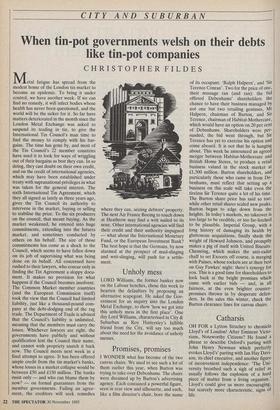CITY AND SUBURBAN
When tin-pot governments welsh on their debts like tin-pot companies
CHRIS TOPHER FILD ES
Metal fatigue has spread from the modest home of the London tin market to become an epidemic. To bring it under control, we have another week. If we can find no remedy, it will infect bodies whose health has never been questioned, and the world will be the sicker for it. So far have matters deteriorated in the month since the London Metal Exchange was asked to suspend its trading in tin, to give the International Tin Council's man time to find the money to comply with his bar- gains. The time has gone by, and most of the Tin Council's 22 member countries have used it to look for ways of wriggling out of their bargains as best they can. In so doing, they cast doubt on their own credit, and on the credit of international agencies, which may have been established under treaty with supranational privileges in what was taken for the general interest. The sixth International Tin Agreement, which they all signed as lately as three years ago, gives the Tin Council its authority to intervene in the market, buying or selling to stabilise the price. To the six producers on the council, that meant buying. As the market weakened, he entered into huge commitments, extending into the futures market, and sometimes conducted by others on his behalf. The size of those commitments has come as a shock to the Council, which seems to have fallen down on its job of supervising what was being done on its behalf. All concerned have rushed to their lawyers, who concur only in finding the Tin Agreement a sloppy docu- ment. It makes no provision for what happens if the Council becomes insolvent. The Common Market member countries (and the European Commission itself) took the view that the Council had limited liability, just like a thousand-pound com- pany at the debt-dodging end of the rag trade. The Department of Trade is advised that the Council's liability is unlimited, meaning that the members must carry the losses. Whichever lawyers are right, the governments have publicly and without qualification lent the Council their name, and cannot with propriety snatch it back now. The Council meets next week in a final attempt to agree. It has been offered ample credit from the tin market's banks, whose losses in a market collapse would be between £50 and £150 million. The banks insist only — and who can blame them by now? — on formal guarantees from the member governments. Failing an agree- ment, the creditors will seek remedies where they can, seizing debtors' property. The next Air France Boeing to touch down at Heathrow may find a writ nailed to its nose. Other international agencies will find their credit and their authority impugned — what about the International Monetary Fund, or the European Investment Bank? The best hope is that the Germans, by now alarmed at the prospect of mud-slinging and writ-slinging, will push for a settle- ment.


























































 Previous page
Previous page